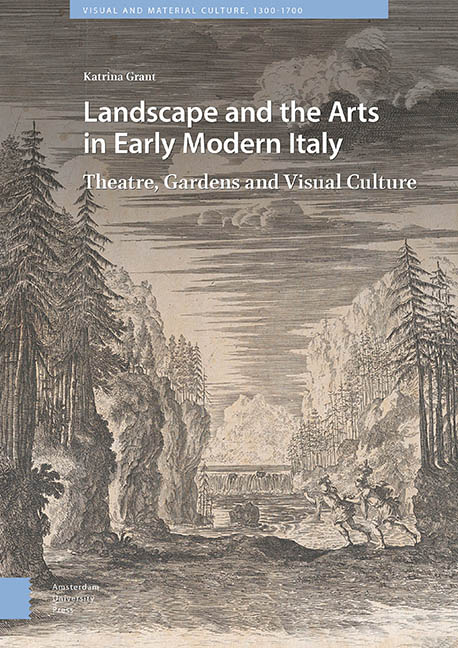Book contents
- Frontmatter
- Contents
- Acknowledgements
- Introduction
- 1 Theatricality, a View from the Landscape
- 2 Gardens of the Gods : Classical Revival, Intermedi, Early Opera and the Idea of Nature
- 3 The (Singing) Figure in the Landscape
- 4 Triumph over Nature : Machines and Meraviglia on the Seventeenthcentury Stage
- 5 The Theatre in the Landscape : Pliny to Pratolino
- 6 The Garden as Stage, the Visitor as Performer
- 7 Stages without Actors : Theatres of Sculpture, Water and Flowers
- 8 Performing in the Parrhasian Grove : Green Theatres and the Academies
- Bibliography
- Index
8 - Performing in the Parrhasian Grove : Green Theatres and the Academies
Published online by Cambridge University Press: 15 September 2022
- Frontmatter
- Contents
- Acknowledgements
- Introduction
- 1 Theatricality, a View from the Landscape
- 2 Gardens of the Gods : Classical Revival, Intermedi, Early Opera and the Idea of Nature
- 3 The (Singing) Figure in the Landscape
- 4 Triumph over Nature : Machines and Meraviglia on the Seventeenthcentury Stage
- 5 The Theatre in the Landscape : Pliny to Pratolino
- 6 The Garden as Stage, the Visitor as Performer
- 7 Stages without Actors : Theatres of Sculpture, Water and Flowers
- 8 Performing in the Parrhasian Grove : Green Theatres and the Academies
- Bibliography
- Index
Summary
Abstract
This chapter looks at smaller, more intimate performances in the landscape. First, it examines the emergence of hedge theatres in the gardens of members of the Lucchese Accademia degli Oscuri, and the culture of poetic composition and semi-private performances that gave rise to these intimate performance spaces. It then looks at how the ‘academic’ culture of performance in the landscape is transformed in Rome in the decades around 1700, when the performance and place-making culture around the Arcadian Academy ushered in new ideas about both landscape and the performance opera.
Keywords: Italian Academies, Arcadian Academy, Lucca, Accademia degli Oscuri, Garden Theatres
The garden theatre must be understood not only as an architectonic form, but as representative of a broader culture of performance. As explored in the previous chapter, these spaces were often symbolic, representative of the spectacle of water or a stage for the display of antiquities. But gardens were also performance spaces in the more traditional sense, sites for festivals and large-scale equestrian ballets, and also for the recitation of poetry, the performance of prose and intellectual debates and for musical works such as serenata. While the idea of the garden as a site for large-scale spectacle is well known, through the fame of sites like the Boboli gardens and Versailles, the use of the garden for smaller, more intimate gatherings centred upon performance has received less attention. Central to this intellectual and often more intimate culture of performance were the academic societies that flourished across many Italian cities from the sixteenth century until the eighteenth. In previous chapters their role in the emergence of new forms of theatre such as opera and in debates about drama and poetry has been explored, but they also played an important role in the conceptualization of gardens and landscape spaces as sites for performance.
The tradition of informal intellectual groups conducting their meetings within garden spaces goes back to the ancient Greeks, and the belief that Plato and Aristotle taught philosophy within groves. The very name ‘academia’ derives from Plato's Grove of Academe (though the revival of the word in the sixteenth century can be closely tied to Cicero's ‘New Academy’ and Academic dialogues).
- Type
- Chapter
- Information
- Landscape and the Arts in Early Modern ItalyTheatre, Gardens and Visual Culture, pp. 233 - 262Publisher: Amsterdam University PressPrint publication year: 2022



